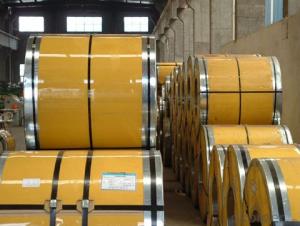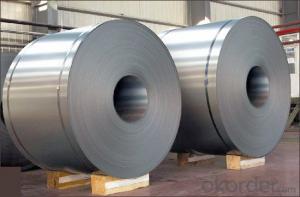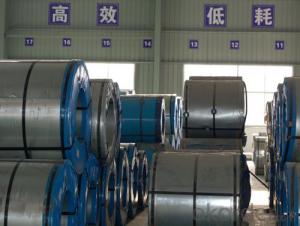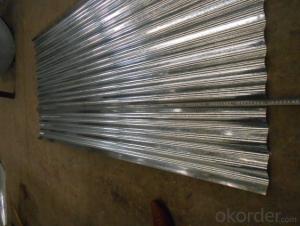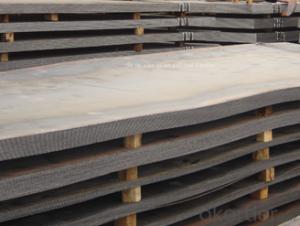Best Quality Hot Dip Galvanized Steel Coil Regular Spangle
- Loading Port:
- Tianjin
- Payment Terms:
- TT OR LC
- Min Order Qty:
- 25 m.t.
- Supply Capability:
- 50000 m.t./month
OKorder Service Pledge
OKorder Financial Service
You Might Also Like
Steel Specification:
Thickness: 0.2-3.0mm
Width: 600-1500mm
Coating Mass: Z08,Z12,Z18,Z20,Z22,Z25,Z27,Z35
Z80,Z120,Z180,Z200,Z220,Z250,Z275
Tolerance for thickness,width,flatness and so on conform to the requirements of JIS G3302 or ASTM A653M/924M
Coil ID can be either 508mm or 610mm, maximum coil OD is 2000mm
The speicfication of ASTM Such as A653m,A924 M and so on have been updated to the latest revisions
Application:
BUILDING & CONSTRUCTION
Floor decks, ceilings, verandas, rolling doors, warehouse, partitions, sheds, gutters, wall, underground piping, sashes, beams, fences, scaffolding, indoor decorations, ducts, ventilating pipes, steel frames and cable trays.
ELECTRICAL APPLIANCES
Freezers, video recorder cases, motor cases, lighting fittings, water heaters, washing machines, refrigerators, stoves, air conditioners, dehumidifiers, fluorescent light housings, electrical heaters, toasters, microwave oven enclosures and switch boxes.
TRANSPORTATION
Containers, under body panels, bus & truck body panels, fuel tanks, noise screens, highway signs, air cleaners, conveyor systems and guard rails.
AGRICULTURAL EQUIPMENT
Barns, drying machines, animal houses, hoppers, irrigation systems, greenhouses, water tanks, sheds, silos, agricultural implements and feeders.
FURNITURE & OTHERS
Vending machines, drums, cans, pails, sauna inner parts, chimney pipes, entertainment machines, solar collectors, office equipment, steel furniture, tool boxes, garages and waste bins.
COMPUTER'S APPLIANCES
Computer shells and communication instruments。
Surface Treatment:
Chromating treatment or anti-finger print
Surface Finished:
REGULAR SPANGLE:
Regular spangle is also called normal spangle which is naturally formed without any additional treatment during galvanizing.
MINI SPANGLE:
The spangle is restrained and formed as mini spangle by reducing the lead content in the zinc liquid or by blowing the zinc powder from the equipment installed on the zinc pot.
EXTRA SMOOTH:
The mini spangle is further skin-passed to produce the extra smooth surface.
- Q:What are steel sheets used for?
- Steel sheets are commonly used in construction and manufacturing industries for various applications such as roofing, cladding, automotive bodies, appliances, and structural components.
- Q:What is the average wind load capacity of steel sheets?
- The wind load capacity of steel sheets can differ depending on a range of factors, including sheet thickness, steel type, and the specific design and installation of the structure. However, steel sheets are renowned for their robustness and endurance, enabling them to withstand substantial wind loads. When it comes to roofing or cladding applications, steel sheets are typically engineered to meet precise wind load demands in accordance with regional building codes and standards. These standards take into consideration factors such as geographical location, building height, exposure category, and wind speed. Engineers and architects rely on calculations and simulations to determine the wind load capacity of steel sheets and analyze the forces exerted by the wind on the structure. They take various factors into account, including wind pressure, building orientation, surface area, and the shape and profile of the steel sheets. In conclusion, the average wind load capacity of steel sheets cannot be generalized due to the influence of numerous factors. It is essential to seek guidance from a structural engineer or building professional to establish the appropriate wind load capacity requirements for a specific steel sheet application.
- Q:How long do steel sheets last?
- The lifespan of steel sheets can vary depending on various factors such as the quality of the steel, the environment in which they are used, and the maintenance provided. However, with proper care and maintenance, steel sheets can last for several decades, if not longer.
- Q:How do steel sheets handle electromagnetic interference?
- Steel sheets are highly effective in handling electromagnetic interference (EMI) due to their inherent electrical conductivity and magnetic permeability. These properties allow steel sheets to act as a shield against electromagnetic waves and prevent their penetration into or out of an enclosed space. When exposed to EMI, steel sheets act as a barrier, reflecting and absorbing electromagnetic waves, thus minimizing their impact on electronic devices and systems. This shielding effect is particularly crucial in sensitive environments such as data centers, laboratories, or industrial facilities where electromagnetic interference can disrupt electronic equipment and compromise their functionality. The thickness and composition of the steel sheet also play a significant role in determining its effectiveness in handling EMI. Thicker sheets provide better shielding due to increased attenuation of electromagnetic waves. Additionally, certain types of steel alloys, such as carbon steel or stainless steel, offer enhanced EMI shielding capabilities. It is important to note that while steel sheets provide excellent EMI shielding, they are not entirely impervious to electromagnetic waves. Factors such as the frequency of the waves and the size of any openings or gaps in the steel sheet can affect their shielding effectiveness. Therefore, proper installation and grounding techniques are essential to ensure optimal EMI protection. Overall, steel sheets are a reliable choice for managing electromagnetic interference, making them a preferred material in various industries where EMI shielding is critical for the uninterrupted operation of electronic devices and systems.
- Q:Can steel sheets be used for interior wall applications?
- Yes, steel sheets can be used for interior wall applications. Steel sheets are strong, durable, and fire-resistant, making them suitable for use in various indoor settings. They can be installed as decorative panels or as a base material for wall cladding systems. Additionally, steel sheets offer benefits such as easy maintenance, excellent sound insulation, and the ability to withstand moisture and humidity.
- Q:What is the average bending radius for steel sheets?
- The average bending radius for steel sheets can vary depending on the thickness and type of steel being used. However, a common range for the average bending radius of steel sheets is between 0.5 to 2 times the thickness of the sheet.
- Q:Are steel sheets resistant to abrasion?
- Yes, steel sheets are generally resistant to abrasion due to their strong and durable nature.
- Q:What is the thickness of the water resisting steel plate of the electrical outlet?
- According to the standard atlas "waterproof sleeve 02S404", the thickness of the water stopping ring steel plate should be 10mm~14mm.
- Q:Can steel sheets be used for automotive manufacturing?
- Yes, steel sheets can be used for automotive manufacturing. Steel is a widely used material in the automotive industry due to its strength, durability, and cost-effectiveness. Steel sheets are commonly used in various automotive components such as body panels, chassis, frames, and structural reinforcements. They provide the necessary strength and rigidity required for the safety and performance of vehicles. Moreover, steel sheets can be easily formed and molded into different shapes, making them suitable for complex automotive designs. Additionally, steel is readily available, making it a popular choice for automotive manufacturers.
- Q:What is the thickness range for steel sheets?
- The thickness range for steel sheets can vary depending on the specific type and grade of steel, but it typically ranges from 0.4 millimeters to 6 millimeters or more.
1. Manufacturer Overview |
|
|---|---|
| Location | |
| Year Established | |
| Annual Output Value | |
| Main Markets | |
| Company Certifications | |
2. Manufacturer Certificates |
|
|---|---|
| a) Certification Name | |
| Range | |
| Reference | |
| Validity Period | |
3. Manufacturer Capability |
|
|---|---|
| a)Trade Capacity | |
| Nearest Port | |
| Export Percentage | |
| No.of Employees in Trade Department | |
| Language Spoken: | |
| b)Factory Information | |
| Factory Size: | |
| No. of Production Lines | |
| Contract Manufacturing | |
| Product Price Range | |
Send your message to us
Best Quality Hot Dip Galvanized Steel Coil Regular Spangle
- Loading Port:
- Tianjin
- Payment Terms:
- TT OR LC
- Min Order Qty:
- 25 m.t.
- Supply Capability:
- 50000 m.t./month
OKorder Service Pledge
OKorder Financial Service
Similar products
New products
Hot products
Related keywords
